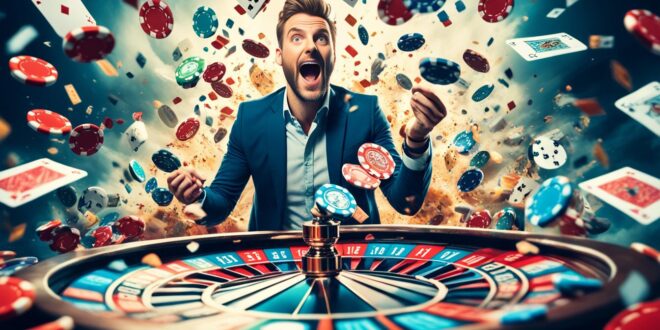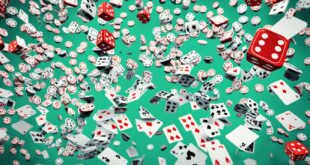At the heart of a high-stakes game lies the psychology of gambling, an intricate web of excitement, risk, and cognitive twists that pulls players back to the table. Beyond the glittering lights and the clink of chips, gamblers both casual and compulsive ride the same wave of anticipation, yet with differing fates at hand. What compels individuals to place their bets in the face of astronomical odds? Ongoing investigations into the psychology of gamblers have peeled back layers, revealing how the thrill of the gamble can oscillate between harmless fun and a serious gambling addiction.
Within these explorations, cognitive biases surface as significant players, warping reality with promises of luck and illusions of control. Whether one relishes the social camaraderie of a casual poker night or finds themselves ensnared in the grip of addiction, these psychological dynamics dictate a range from healthy entertainment to extreme behavior patterns. The allure of a win and the narrow escape of a near miss further fuel the intricate cognitive biases in betting. As the roulette wheel spins, let’s delve into the cogent mindscape that defines the gambler’s quandary.
Exploring the Fascination Behind the Bet

The journey from delighting in the occasional flutter to the grips of gambling addiction is a salient transformation that often goes undetected until it becomes severe. Understanding this transition is crucial for both individuals and healthcare professionals as they navigate the complexities of gambling behaviors.
From Recreation to Compulsion: Tracing the Spectrum
Recreational gambling is embraced by many as a form of entertainment, a social pastime that is practiced responsibly. It is not uncommon to find individuals who partake in the occasional bet, reveling in the social and psychological effects of winning without tipping the scales towards addiction. However, the metamorphosis into compulsive gambling can occur subtly over time.
Compulsive gambling, characterized by the inability to restrain from gambling despite adverse repercussions, represents the more severe end of the spectrum. This chronic and progressive behavior, often known as gambling addiction, affects a person’s psychological, financial, and social well-being. The key to understanding gambling addiction lies in recognizing the signs that indicate a shift towards compulsive behaviors.
- Increased frequency of gambling sessions
- Growing monetary stakes in bets
- Betting to recover lost money, leading to a vicious cycle
- Irritability or restlessness when not gambling
- Secrecy about gambling habits or financial status
The Role of Reward Systems: Striatum and Gambling
The brain’s reward systems, particularly the striatum, play a significant role in the psychological reinforcement of gambling habits. The striatum is responsive to stimuli that offer rewards, comparable to the enjoyment derived from food or sex, and it also mirrors the addictive properties found in substance abuse.
Dr. Luke Clark has illuminated how these neurological responses to financial gains foster the excitement associated with gambling, essentially becoming a driving force behind one’s continued indulgence in gambling activities. It is the intricate functioning of the striatum and the reward pathways that may contribute to the distinction between recreational gambling and an addiction.
- The striatum responds to wins and near-wins, releasing dopamine that enhances the feeling of pleasure.
- This dopamine release can lead to a learned association between gambling and positive emotions.
- Over time, this can result in an increased desire to gamble, even with growing losses.
- In those susceptible to addiction, this neurobiological response is more pronounced, developing into compulsive gambling.
Arming oneself with knowledge about these neurological foundations can aid in understanding gambling addiction and drawing more definitive lines between different gambling behaviors.
The Allure of Chance: Understanding Gambling Addiction
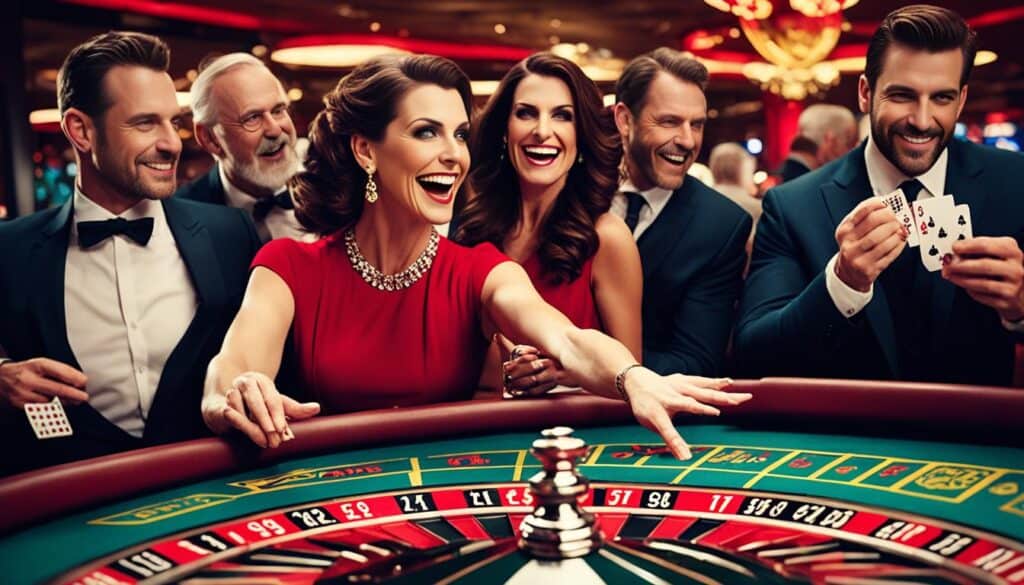
The psychology of gambling addiction taps into the deepest fascinations of the human psyche, where the allure of gambling meets the indomitable will to win. The seductive odds, the beating thrill of possibly outsmarting ‘the house’, and the potent adrenaline rush—it’s a cocktail that can lead to compulsive gambling in some individuals. Despite the statistical improbability of sustained success, the glittering promise of a big win persists in drawing in scores of hopefuls.
Recognizing the signs of a gambling problem is a cornerstone of psychological research into this type of addiction. Unlike casual bettors who play mainly for fun, those grappling with compulsive gambling find themselves ensnared by a persistent belief in a big payout ahead. This belief is often supported by an ‘illusion of control’, where gamblers overestimate their ability to influence the outcome of what is essentially a game of chance.
- Cognitive distortions such as the gambler’s fallacy, where a player believes past events can influence future outcomes, further exacerbate this issue.
- The ‘near-miss’ effect, producing a psychological tease and the illusion that a win was ‘just missed’, can fuel the addictive cycle.
- Environmental factors, such as the ease of accessibility to gambling venues and the role of society and legislation, also contribute to the prevalence of gambling paths.
One cannot discuss the psychological allure of gambling without examining the spectrum of its influence. While some individuals engage in this activity without harmful repercussions, for others, it spirals into an all-consuming pursuit. This dichotomy is at the heart of ongoing research, as experts like Dr. Clark delve into the psychological mechanics that differentiate a hobby from an addiction. In studying such patterns, the goal remains to develop better preventative measures and treatment for those caught in the snare of gambling addiction.
Cognitive Biases and the Gambler’s Mindset
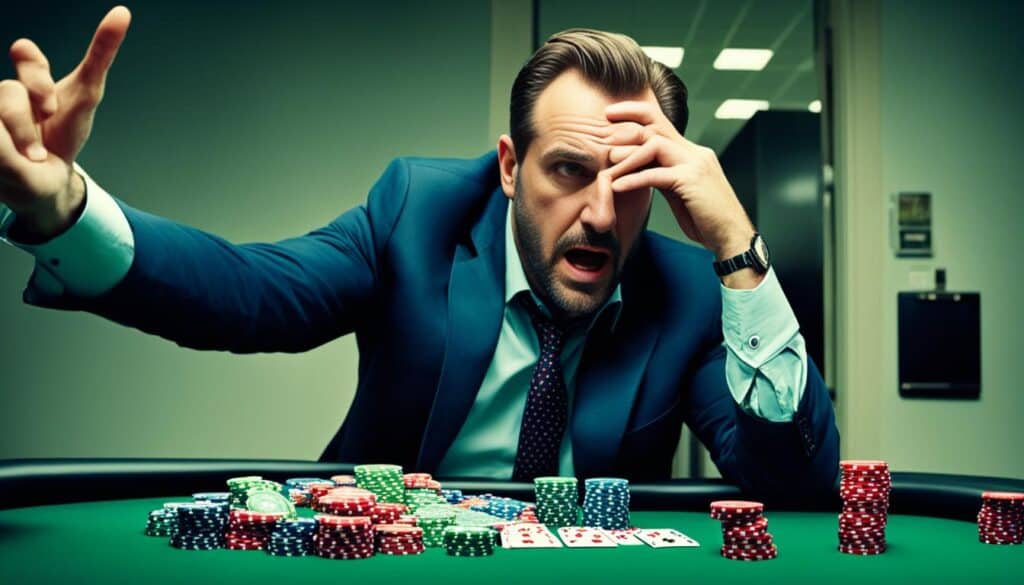
Understanding the complexities of gambling requires a deep dive into the psychological phenomena known as cognitive biases. These mental shortcuts impact the gamblers’ mindset, shaping their behavior and interactions with gambling activities.
The ‘Illusion of Control’ Phenomenon
Gamblers often fall prey to the ‘illusion of control,’ a cognitive bias where they believe they have more power over the outcome of a game of chance than they actually do. This illusion is a significant factor that contributes to gambling decisions and can be intensified through various activities:
- Selecting one’s own lottery numbers as opposed to random auto-generated numbers.
- Engaging in superstitions or rituals before or during gambling sessions.
- Believing in ‘hot’ or ‘cold’ streaks, ascribing success to one’s own strategy or system.
These behaviors lead to an overestimation of one’s influence on the game, reinforcing the ‘illusion of control’ and driving further betting.
Impact of Near-Misses on Continued Play
Near-misses in gambling occur when the outcome is close to a win, prompting an emotional response often comparable to an actual win. This phenomenon influences the gambler’s behavior through:
- Encouraging a belief that success is imminent, leading to continuous play.
- Strengthening the misjudgment of one’s skill level or impact on the game outcome.
- Creating a sense of urgency and excitement, both of which fuel further betting.
The seductive nature of near-misses maintains the cycle of gambling, with individuals holding onto the belief that the big win is just around the corner.
In wrapping up, cognitive biases in betting such as the ‘illusion of control’ and the persuasive impact of near-misses play pivotal roles in the persistence of gambling behaviors. They actively shape the gamblers’ mindset, prompting a continuous loop of betting in the pursuit of mastering the elusive win. Acknowledging and addressing these psychological aspects are vital in fostering responsible gambling practices and providing support to those who may struggle with gambling’s cognitive traps.
The Thrill of the Gamble and Its Psychological Underpinnings

The thrill of the gamble transcends mere participation in games of chance; it encompasses an intrinsic psychological and physiological response that mirrors the heightened emotions of competitive sports. Assessing the psychological effects of gambling, one discovers the profound impact on the human reward system, and why placing a bet can induce an adrenaline rush akin to that experienced by athletes in the throes of competition.
- Neurotransmitter Release: During the act of gambling, the release of dopamine in the brain’s reward pathways contributes to the sensation of pleasure and gambling excitement.
- Involvement of the Striatum: This brain region plays a crucial role in the processing of rewards, and its overstimulation through gambling can lead to behavior that seeks out repetitive engagement in betting activities.
- Adrenaline and Action: The link between the action of betting and the resulting adrenaline rush reinforces the cycle of behavior that leads individuals to continuously return to the gamble, despite potential losses.
Understanding the psychological effects of gambling is imperative for addressing the broader spectrum of gambling behavior, from recreational enjoyment to problematic compulsion. Recognizing the powerful synergy between action and reward offers foundational insight into why the gamble holds such captivating sway over players around the world.
Psychology of a Gambler: Why the Risk Captivates
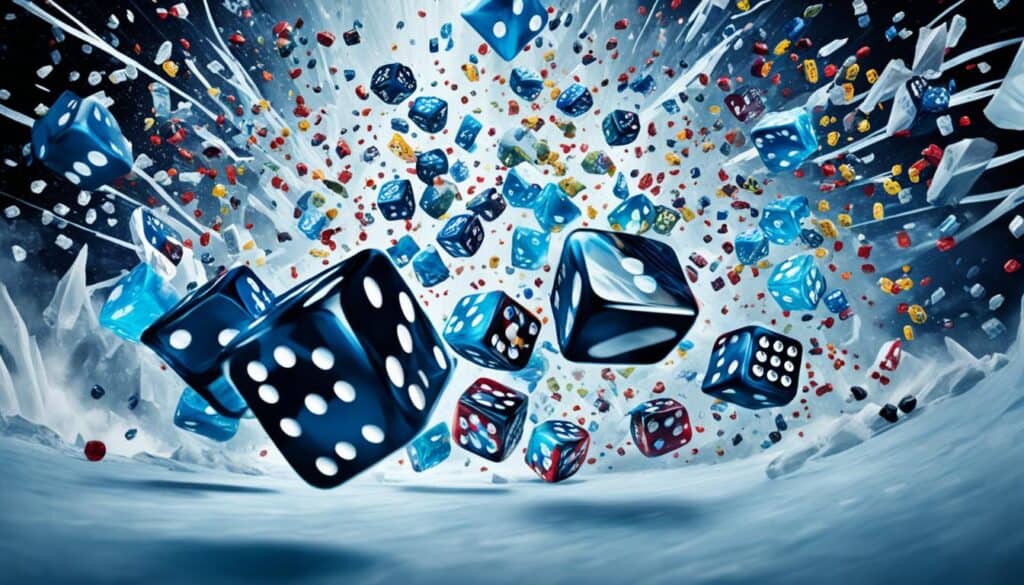
The lure of gambling lies in the deep psychological drives that spark the desire to take risks. It’s not just the potential monetary gain that calls to the gambler, but a complex amalgamation of excitement, social interaction, and intrinsic motivations. Through understanding the psychology of a gambler, the excitement of betting becomes clear, and we see how personal and societal aspects significantly shape the gambling experience.
Seeking Excitement: Adrenaline’s Role in Betting
The parallels between high-stakes gambling and extreme sports are numerous, with the central link being the rush of adrenaline. This hormone, synonymous with the excitement of betting, acts as a catalyst for the gambler’s eagerness to continue in the face of risk. It is this physiological response that underscores the recreational gambler’s motivation—a desire for the thrill that elevates gambling from a mere activity to an exhilarating pursuit.
- Understanding the visceral response to risk and reward.
- Examining how adrenaline influences decision-making during gambling.
- Describing the role of neurotransmitters in the highs and lows of gambling.
Social and Personal Factors Influencing Betting Behavior
Social gambling takes the inherent excitement of the experience and amplifies it through the dimensions of community and rivalry. Often, gambling is not an isolated endeavor; it’s a social ritual. The fabric of gambling psychology is woven with threads of peer influence, the feeling of belonging within a group, and the social capital gained from demonstrating prowess or wealth. These factors coalesce to motivate the recreational gambler, for whom the social aspects of betting can be as important as the potential financial rewards.
- The impact of group dynamics on gambling habits.
- The relationship between gambling behavior and social status.
- Recreational gamblers who seek community and competition in gaming environments.
Behavioral and Neurological Analysis of Casino Gamblers

Delving into the complex world of gambling, the behavioral analysis of gambling along with a neurological study on gambling provides us profound insights into the different kinds of players who frequent casinos. Notably, Dr. Marc Potenza’s research has been instrumental in dissecting the intricate features of casino gamblers’ behavior.
The study of casino environments and gambling activities allows experts to observe the behaviors that differentiate casual players from those struggling with gambling problems. Understanding these distinctions is not just academically interesting—it’s crucial for developing more effective interventions and preventive strategies.
Findings from Dr. Marc Potenza’s Gambling Studies
In the pursuit of understanding casino gamblers, Dr. Marc Potenza has scrutinized the psychological patterns and neurological reactions associated with gambling. His work adds a significant layer of knowledge to the field of psychopathology and addiction studies. The data collected through his research has been pivotal in identifying the diverse triggers and responses in gamblers’ brains.
Key Differentiators Between Recreational and Problem Gamblers
- Recreational gamblers typically display controlled patterns of betting, with their brain activity reflecting a stable response to gambling stimuli.
- Conversely, problem gamblers show an abnormal, heightened brain response, suggesting a deeper neurological implication in their gambling behaviors.
- Additionally, the persistence of activity within certain brain regions amongst problem gamblers indicates a possible inherent susceptibility to addictive behaviors.
This exploration into the cognitive and neurological domains underscores the necessity for tailored approaches when addressing different types of gambling behaviors. The evidence provided by these studies is a cornerstone in formulating specialized treatment strategies for those afflicted by gambling disorders.
Psychology of Gamblers: The Drive for the Big Win
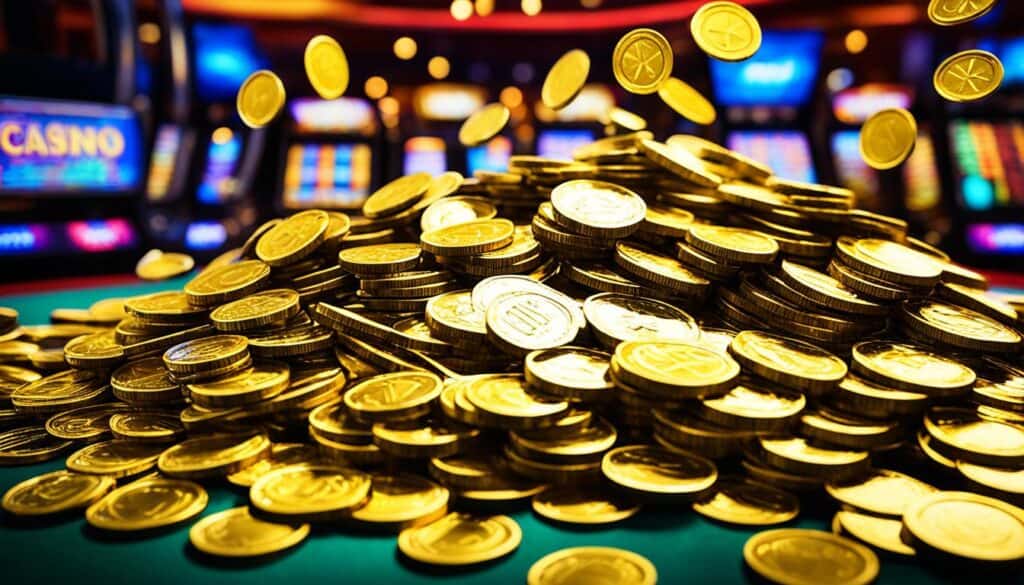
In the fascinating world of gambling, the psychology of gamblers is as complex as it is compelling, driving individuals toward the elusive promise of a life-changing jackpot. It is not just the act of betting, but the underlying gambling motivation that deserves scrutiny, as it reveals a tapestry of human desires interwoven with the high stakes of chance encounters.
One of the most captivating yet perilous aspects of this motivation is the phenomenon known as chasing losses. This behavior showcases the human tendency to continue gambling in the face of mounting deficits, spurred by the belief that a single win can reverse their fortunes. This often leads to an intense, sometimes destructive cycle, as clients dig themselves deeper into financial woes, unable to step away from the game.
The big win allure persists, fed by stories of overnight millionaires and the seemingly attainable glitz and glamour that a major jackpot win represents. Casinos ingeniously tap into this allure, fueling the dreams of patrons with the sights and sounds of success—jackpot sirens, flashing lights, and the resonant clatter of coins.
- Motivations spanning from the thrill of the risk to the need for a financial windfall
- Cognitive biases, including the ‘gambler’s fallacy’ and ‘illusion of control’
- Emotional consequences of the chase—stress, exhilaration, and sometimes despair
The roulette wheel spins, slot machines whirl, and cards are dealt, each event watched by eager eyes, all fueled by the inner narrative that the next gamble could be the one to turn defeat into victory. Recognizing these psychological elements is critical in understanding why people gamble and how we can help those who lose sight of the line between entertaining pastime and hazardous obsession.
When the Fun Stops: Signs of Gambling Becoming a Problem
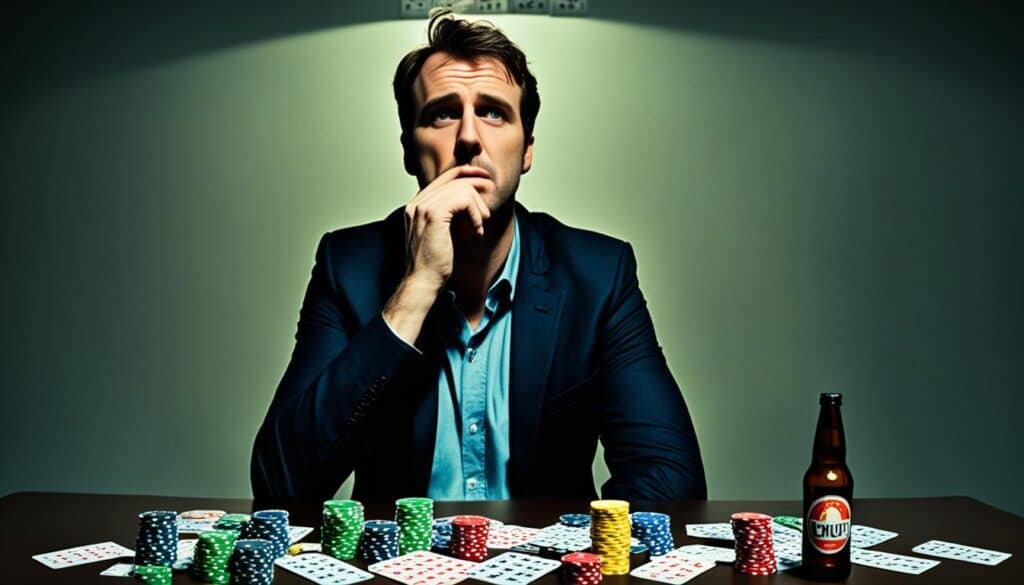
As gambling activities become more accessible and prevalent, it is essential to recognize when this pastime crosses the line into problematic behavior. Knowing the signs of a gambling problem can aid in early intervention and prevent the development of compulsive gambling.
Recognizing the Warning Signals
Problem gambling indicators often manifest as behavioral changes that disrupt one’s normal routine and relationships. These signs include:
- A preoccupation with gambling activities to the detriment of work, family, and social obligations.
- An inability to reduce or stop gambling, despite repeated attempts and the negative consequences faced.
- Financial indicators such as increasing debts, borrowing money to gamble, or selling personal possessions to fund gambling activities.
- Chasing losses with the false conviction that one can recover funds through more gambling.
- Employing gambling as an escape from stress, anxiety, or depression, rather than addressing these issues in healthy ways.
The Role of Cognitive Therapy in Treating Compulsive Gambling
For those grappling with compulsive gambling, cognitive therapy for gambling addiction provides a structured and evidence-based approach to recovery. Cognitive-behavioral therapy (CBT), in particular, focuses on:
- Identifying and restructuring irrational and harmful thought patterns that support gambling behavior.
- Developing problem-solving skills and coping mechanisms to manage urges and prevent relapses.
- Improving financial management and planning to address the economic impact of gambling addiction.
- Establishing a supportive network and finding alternative healthy activities to replace gambling.
Despite the challenges, CBT offers a path forward for many individuals, equipping them with the necessary tools to combat addiction and reclaim control over their lives.
Pathological Gambling: The Psychological Abyss

The descent into the depths of pathological gambling is a journey that terminates far beyond the thrill or social enjoyment associated with casual betting. In this bleak psychological abyss, the act of gambling transcends recreation and becomes a force of compulsion—the heart of a severe condition recognized as gambling disorder. Within this context, the psychology of compulsive gambling is not merely an issue of lack of willpower; it is anchored in profound biological and psychological disruptions.
Scientists have honed in on the orbitofrontal cortex, a brain region as a pivotal area of interest. Here, chemical imbalances may instigate and perpetuate the cycle of compulsive betting. This dysfunction intersects with the psychology of gambling addiction, where the drive to gamble is fueled by an irregular response to dopamine—a neurotransmitter intrinsically linked to feelings of pleasure and reward.
- Dopamine dysregulation plays a notorious role, drawing parallels to the patterns observed in substance addiction.
- Learned behaviors, including the habitual response to environmental triggers associated with gambling sensations, compound the disorder.
- Pathological gambling often coexists with a spectrum of other psychological issues, highlighting the intricate link between mental health and compulsive behaviors.
As we delve into the intricacies of pathological gambling, understanding its underpinnings is key to addressing the disorder. The complexity of psychological factors involved necessitates multifaceted treatment approaches, ranging from therapy to possibly pharmacological interventions.
Psychological Effects of Winning and Losing
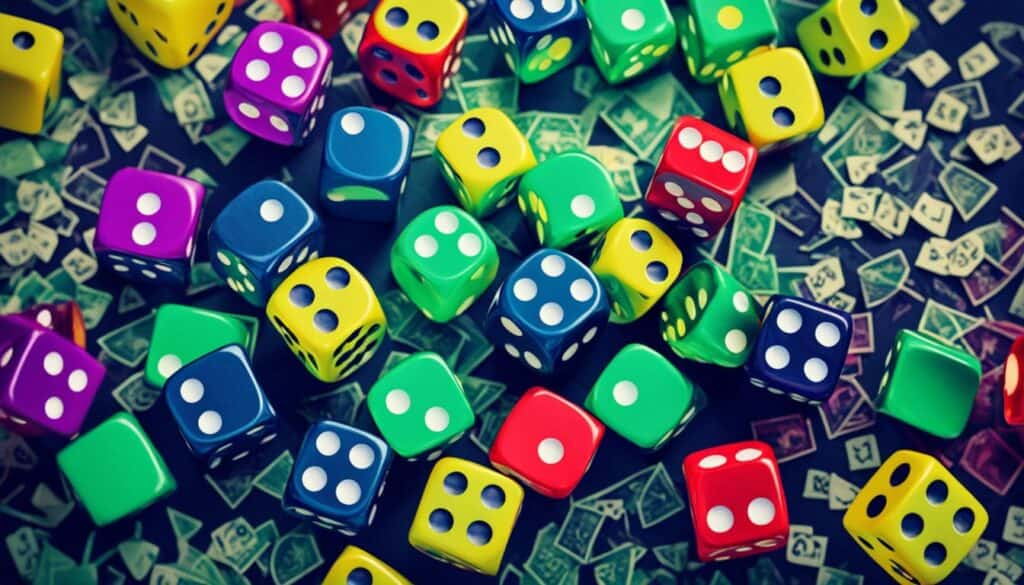
The rollercoaster of emotions tied to gambling is influenced greatly by the outcomes, where the psychological effects of winning can significantly differ from the emotional impact of facing losses. Recognizing these variances is vital to understanding the full narrative of gambling’s effects on mental health.
The Highs and Lows: Emotional Responses to Gambling Outcomes
When gamblers experience the rush of a victory, the psychological effects of winning can elevate their mood and self-perception. This winning high delivers a potent mix of excitement and perceived competency, often releasing a flood of dopamine that reinforces the behavior. However, the pendulum swings dramatically when a loss occurs. The emotional impact of gambling is substantial, with defeat instigating feelings of frustration, anger, or despair. The aftermath can linger, affecting one’s daily life and mental state.
Dealing with Losses: Psychological Strain on the Gambler
Dealing with gambling losses presents a formidable challenge that can lead to a dangerous cycle. As the gambler strives to recoup their losses, the psychological strain intensifies. It may prompt impulsive decisions and risky betting strategies, which can compound losses and exacerbate feelings of distress. This strain not only affects the individual but can also have ripple effects on relationships, financial security, and overall well-being.
- Understanding these psychological dynamics is crucial for both individuals and professionals who provide support to those affected by gambling outcomes.
- It is equally important for the broader community to acknowledge the emotional toll of gambling to foster environments that encourage responsible gaming and provide resources for those in need.
Demographic Factors in Gambling: Who Is Most at Risk?
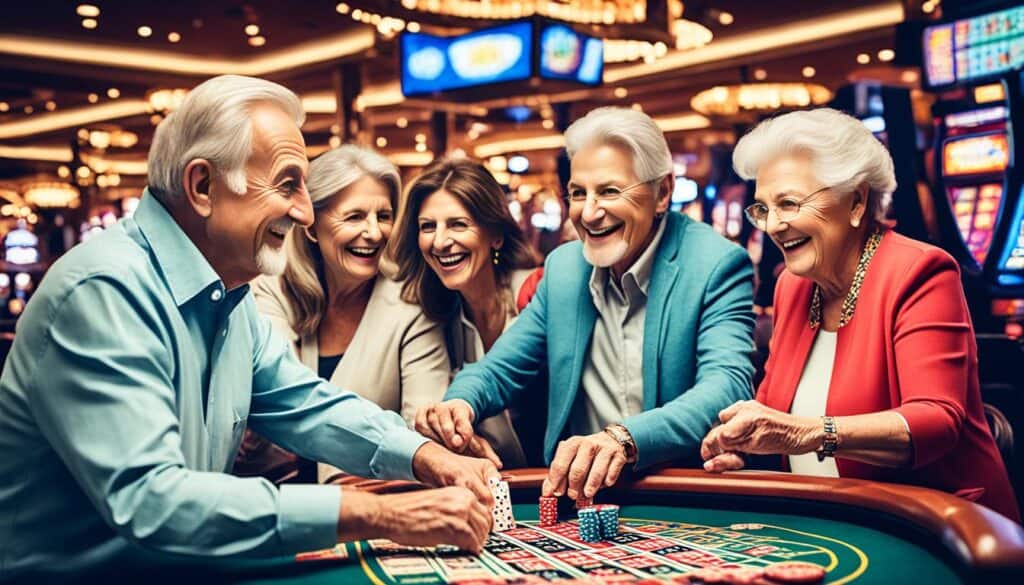
Dissecting the demographics of gambling reveals key patterns that identify groups particularly vulnerable to gambling addiction. Factors such as age, gender, and economic status are crucial when analyzing these trends.
The Influence of Gender and Age in Gambling Behavior
Select demographic characteristics such as gender and age in gambling show considerable influence on gambling habits and risk levels. Data indicates a higher incidence of gambling problems among certain age groups and genders:
- Young adults, generally those aged 18 to 29, are often more exposed and consequently, demonstrate increased vulnerability to the enticements of gambling.
- Male gamblers, statistically, are found to be at a higher risk of developing problematic gambling behaviors than their female counterparts.
Economic Status as a Predictor of Gambling Issues
Economic factors cannot be ignored when examining the economic status and gambling risk. Individuals with less financial stability may perceive gambling as a fast track to economic gain, placing them at a heightened risk:
- Lower-income populations may view gambling wins as life-changing, which can motivate persistent gambling despite recurrent losses.
- The pressure to improve one’s financial predicament through gambling can result in a higher likelihood of developing addiction.
Given these insights, initiatives aimed at mitigating risk should focus on the intersection of demographic factors in gambling. Understanding these variables is essential to tailor prevention and intervention programs that address the unique challenges and vulnerabilities to gambling addiction amongst diverse population segments.
Psychology of Gambling Addiction: Dopamine and Decision-Making
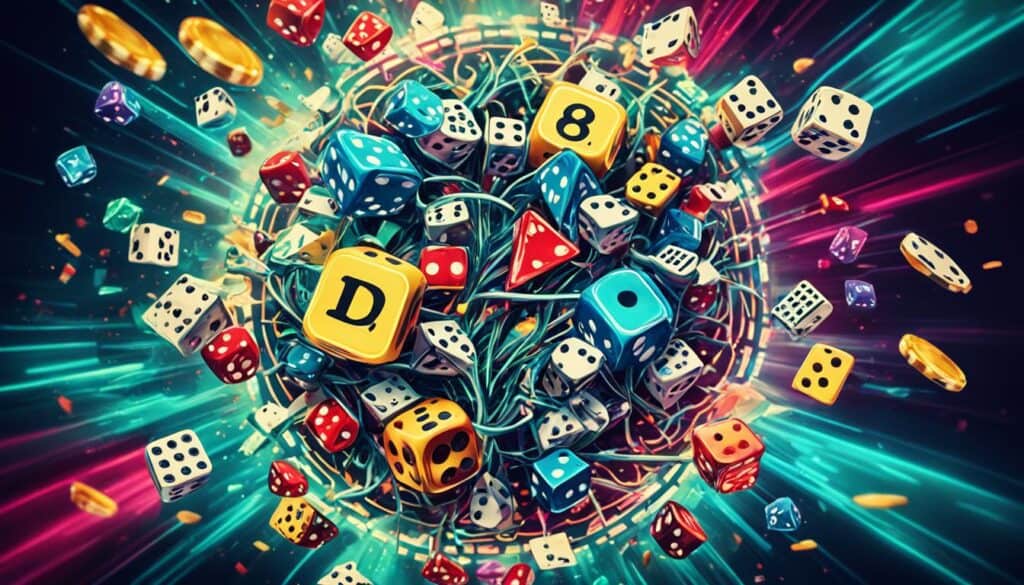
The intricate relationship between dopamine in gambling addiction and the cognitive process of decision-making in gambling has been an area of avid interest among addiction psychology researchers. Dopamine, a critical neurotransmitter linked to reward and pleasure, plays a significant role in reinforcing gambling behavior. It is this neurochemical pathway that can turn a leisure activity into a compulsive habit, impacting the very core of a gambler’s ability to make sound decisions.
When examining neurotransmitters and gambling, it is essential to look at the entire neural circuitry involved. The orbitofrontal cortex, a brain region that contributes to the assessment of rewards and decision-making, often shows altered activity in those with gambling disorders. Here are some points that underscore the connection between dopamine’s regulation and gambling addiction:
- Dopamine levels can become dysregulated in a gambler’s brain, leading to patterns of behavior akin to those observed in substance abuse.
- Heightened dopamine during a gamble can impair judgment, making the odds appear more favorable, pushing the gambler into a cycle of risk-taking.
- The anticipation of a gambling reward can cause a surge in dopamine, which not only strengthens the addiction but also affects normal decision-making processes.
These chemical imbalances and brain structure roles are fundamental to deciphering the transition from casual entertainment to an addictive cycle where judgment is impaired, and the propensity for risk is inflated.
The Psychology of Gambling: Unraveling the Enigma
The complexity of gambling psychology is a tapestry woven with threads of varying human experiences, cognitive distortions, and biochemical reactions, creating an enigma that captivates scholars and professionals alike. This intricate blend fuels the continuous quest to understand what underlies the gambling motivation that drives some to embrace the risk with fervor, while others tread cautiously, if at all. The essence of this oddity is not merely a matter of chance or skill; rather, it is the synergetic dance between the gambler’s internal drives and the external milieu that gambling permeates.
Compulsive gambling understanding has grown in depth and scope, and yet, the riddle endures. With increased accessibility to gambling platforms, touching the lives of a broader demographic including adolescents, the imperative to dissect and comprehend these mechanisms becomes ever more pressing. The intersection of neurological responses to gambling, such as that coveted dopamine surge, with a complex network of motivations and biases, presents a daunting challenge. Our collective ability to detangle this web is critical for fostering sound policies, enlightened interventions, and, ultimately, preventing the slide from recreational to pathological engagement.
The future of gambling’s place in society hinges heavily on our progress in piecing together the psychology of gambling addiction. As mental health, financial well-being, and societal norms pivot at the axis of gambling dynamics, the stakes are high. Only through diligent study, public discourse, and strategic action can we hope to make headway in this ambiguous arena, ensuring we safeguard individuals and communities against the potential adverse effects of this age-old pastime turned modern-day phenomenon.
 Online Gaming Circuit
Online Gaming Circuit
